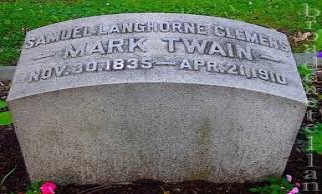Death Of Mark Twain
|
| updated |
Copy Link Code
|
 Mark Twain died from a heart attack on April 21, 1910 at the age of seventy-four. Even though the world was left with his many literary compositions, Mark Twain's death ended an era in some historians have referred to as the defining period of American literature. His humorous stories, his humanitarianism and his gift of storytelling itself left a void never to be filled yet.
Mark Twain died from a heart attack on April 21, 1910 at the age of seventy-four. Even though the world was left with his many literary compositions, Mark Twain's death ended an era in some historians have referred to as the defining period of American literature. His humorous stories, his humanitarianism and his gift of storytelling itself left a void never to be filled yet.
The death of Mark Twain occurred at the time of Halley's Comet passing across the skies at it had done during the period of his birth. Twain had actually predicted the event in 1909:
I came in with Halley's Comet in 1835. It is coming again next year, and I expect to go out with it. It will be the greatest disappointment of my life if I don't go out with Halley's Comet. The Almighty has said, no doubt: 'Now here are these two unaccountable freaks; they came in together, they must go out together.'
Mark Twain died the day after the comet had reached its closest approach to Earth.
President William Howard Taft was one of the first dignitaries to comment after the news of Twain's death spread, noting that "Mark Twain gave pleasure - real intellectual enjoyment - to millions, and his works will continue to give such pleasure to millions yet to come." Within hours of his death, the rich and famous, the political and religious, the poor and downtrodden mourned the death of an icon; many of the mourners could not read or write, but they had heard his stories told over and over again.
Practically every newspaper in America at the time of his death printed Mark Twain's obituary, some samples of which were:
- From The Chicago Daily Tribune, April 23, 1910: (excerpt) "Alas, we can no longer smile at Mark Twain's celebrated jest that the reports of his death were "greatly exaggerated." The laugh which for years has rippled around the world has vanished...."
- From The Los Angeles Times, April 22, 1910: (excerpt) "But that the soul of human nature is preserved in the writings of Mar Twain is shown by their popularity wherever the language is understood.
- From The Washington Post, April 24, 1910, by Arthur B. Krock: (excerpt: First and last stanzas only):
(1)Old Innocence has gone abroad, and
the sea is wide between.
I saw his hand on the misty wheel as
he steered for the darkened main
He took his laugh and he took his pipe
and the place where his heart had been,
And he crossed the bar where the
waters gulped the plumb-line below mark twain.
(2)
'Twould be time to weep for the one
that's gone did the boys he loved go, too,
But Tom and Joe and Sid and Huck
on my study shelves I spy.
So good-by, Mark Twain, may you steer
far out; may the wheel at your helm turn true;
And I'll keep Tom straight while
you're off to sea, and for Huck - - well, Mark, I'll try.
The funeral for Mark Twain was held at the "Old Brick" Presbyterian Church in New York, officiated by Rev. Dr. Henry Van Dyke and Dr. Joseph H. Twichell, old friends of Twain's.
Tickets to the service were provided to over four-hundred people, but many more came to pay their respects. Mark Twain is buried in his wife's family plot at Woodlawn Cemetery in Elmira, New York. His gravesite is marked by a twelve-foot (two fathoms or "mark twain") monument, which was placed there by his only surviving child, Clara.
